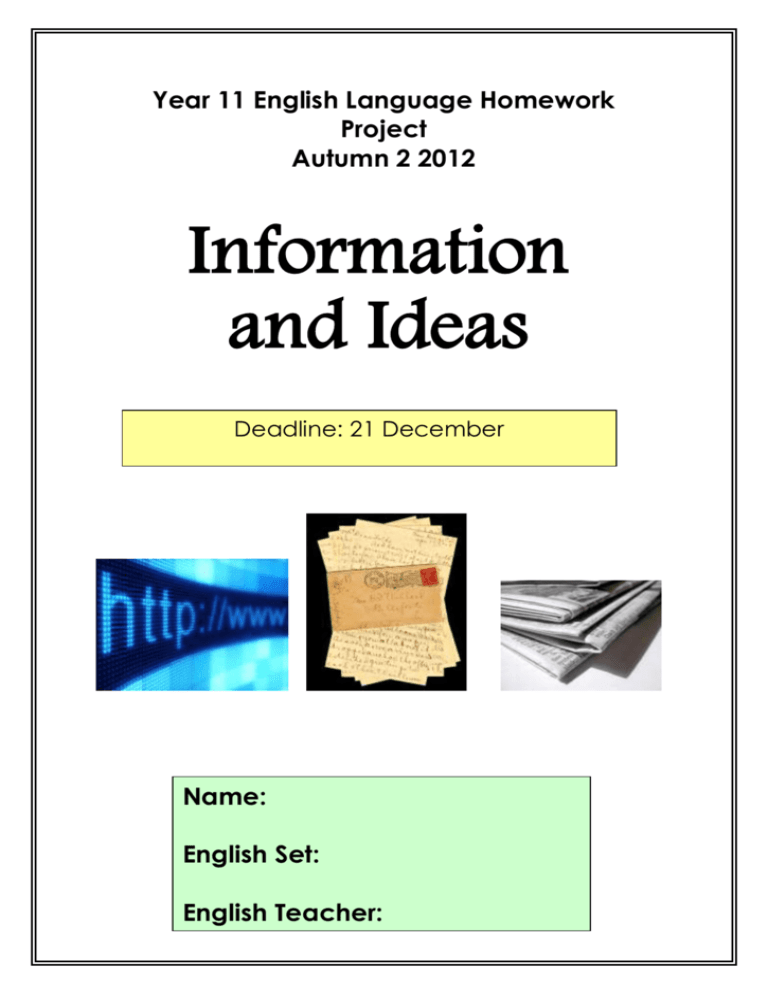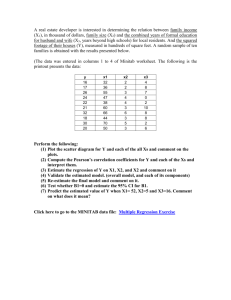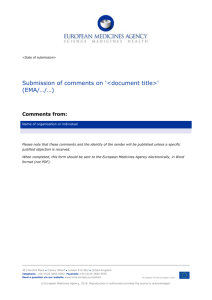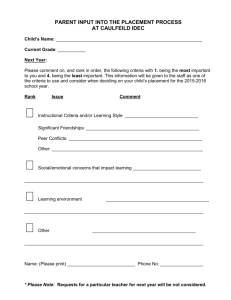
Year 11 English Language Homework
Project
Autumn 2 2012
Information
and Ideas
Deadline: 21 December
Name:
English Set:
English Teacher:
GLOSSARY
Alliteration - the repetition of the same consonant sound, especially at the
beginning of several consecutive words in the same line e.g. ‘Five miles
meandering in a mazy motion’. (From ‘Kubla Khan’ by Samuel Taylor Coleridge).
Assonance – the repetition of similar vowel sounds e.g. ‘There must be Gods
thrown down and trumpets blown’ (From ‘Hyperion’ by John Keats), showing the
paired assonance of ‘must’ and ‘trum...’ and ‘thrown’ and ‘blown’
Atmosphere – the pervading feeling created by a description of the setting, or
the action e.g foreboding, happiness
Audience – the people being communicated to
Aural imagery – images created through sound, by the use of techniques such
as alliteration, assonance and onomatopoeia
Connotation – an association attached to a word or phrase in addition to its
dictionary definition.
Direct speech – the words that are actually spoken
Fact – something which has been established as true and correct
Imagery – the use of words to create a picture or image in the reader’s mind
Imperatives – commands
Irony – the conveyance of a meaning that is opposite to the literal meaning of
the words, e.g ‘This is a fine time to tell me’, (when it is actually an inappropriate
time); a situation or outcome which has a significance unforeseen at the time
Language of Advertising – features and techniques commonly found in
advertising, e.g appealing adjectives, exaggeration
Metaphor – figure of speech in which a person or thing is describes as being the
thing it resembles, e.g ‘she’s a tiger’ to describe a ferocious person
Mood - the atmosphere created by a piece of writing
Objective information – factual ideas
Onomatopoeia – when a word sounds like the noise it describes e.g ‘pop’ or ‘the
murmuring of innumerable bees’
Opinion – a view held by some but not necessarily by others
Personification – the attribution of human qualities or feelings to inanimate
objects; a kind of metaphor where human qualities are given to things or abstract
ideas
Prose – any kind of writing which is not verse, usually divided into fiction and
non-fiction
Purpose – the reason for the communication
Rhetorical Question – question raised in speech that does not require an
answer (used for effect)
Simile – figure of speech in which a person or thing is describes as being like
another, usually preceded by ‘as’ or ‘like’, e.g ‘she’s like a tiger’ to describe a
ferocious person
Structure – the way that a piece of story writing has been put together Style –
(literary) the particular way in which writers use language to express their ideas
Subjective information – personal opinions and feelings
Voice – the speaker of the poem or prose, either the poet or author’s own voice
or that of an invented character
Week 1: November
Account Writing
Learning Objective: To learn how to write an effective account.
Everyone must complete task A.
Most should complete tasks A and B.
Some will complete tasks A, B and C.
Pupil comment on task
Parent comment on task
Tasks
Task A: Find an article that gives an account of something that has
happened. This may be from a newspaper or magazine for example. Read it
and discuss what makes it an account piece of writing. (I.E. What makes it
different to a persuasive piece of writing?)
Task B: Look at the article on the next page. Annotate the features that make
it an account.
Task C: Pick a topic that you are interested in and write an account of it using
the features you have identified to be account writing.
Account for Task B
Link for article from The Guardian website:
http://www.guardian.co.uk/uk/2011/apr/30/royal-weddingwilliam-kate-leave-palace
Royal wedding celebrations wind
down as William and Kate leave
palace
Helicopter carrying royal newlyweds leaves Buckingham Palace for an undisclosed destination after
black-tie celebration
Ben Quinn
guardian.co.uk, Saturday 30 April 2011 13.35 BST
The Duke and Duchess of Cambridge walk hand in hand to a waiting helicopter at Buckingham Palace
Married life dawned for the Duke and Duchess of Cambridge, and a helicopter
carrying the newlyweds left Buckingham Palace for an undisclosed destination.
After spending Friday evening celebrating at the palace with close family and friends,
William and Kate are expected to travel abroad for their honeymoon in the next two
weeks.
St James's Palace said the newlyweds had decided not to depart for their honeymoon
immediately and would spend the weekend privately at an undisclosed location in the
UK.
The prince will return to his job as a search and rescue helicopter pilot next week
before the couple finally take their honeymoon.
The destination has been shrouded in secrecy – the duke reportedly has not even told
his bride where they are going – but speculation is rife over possible choices.
The duke is known to have a deep affection for Africa and would probably be on safe
romantic territory if he chose to take his wife to Kenya, where he proposed to her last
year.
The couple, who have said they want the media to respect their privacy during their
honeymoon, were photographed walking to a helipad and stopping to shake hands
with members of staff.
Friday night's black-tie celebration, which started with dinner in the palace's lavish
ballroom, ended with dancing into the small hours while Prince Harry gave his best
man's speech.
He is reported to have joked about the relative heights of his brother's new bride and
the Duke of Edinburgh, his grandfather, whom she was said to have towered over in
three-inch heels.
Some of the prominent guests returned to their rooms at the Goring hotel at about 3am
as the party at the palace wound down. Prince Harry had announced plans to make an
early morning fry-up for anyone with the constitution to stay awake through the night.
Normal service was resuming around the UK as royalists and party-lovers nursed
hangovers and republicans breathed sighs of relief.
A family friend of the Middletons, Tony Ainsworth, said outside the Goring hotel: "It
has been an historic occasion. After the concerns of getting to the church on time, it
all went smoothly. We had a party at the hotel last night that went on well into the
evening, so we're feeling a little jaded this morning."
He said the bride's parents, Carole and Michael Middleton, made an appearance at the
hotel party. "I went to bed around 1am but I heard guests stumbling around at 5am,
coming back from the palace, which woke me up."
Other tired but happy revellers included the bride's friends who rushed back to
Bucklebury, the Berkshire village where she grew up, to celebrate into the night.
John Haley, owner of the Old Boot Inn in nearby Stanford Dingley, was one of
several residents from the village to have attended the wedding and afterwards he
threw an invitation-only party for 350 guests in his pub, which is thought to be the
duchess's favourite.
He and his partner, Pam Brown, got back to Berkshire to find the party well under
way with the beer garden and pub filled with local residents. He said it had been a
wonderful day. "It was fabulous, it was out of this world. Words can't describe it."
© 2011 Guardian News and Media Limited or its affiliated companies. All rights reserved.
Week 2:
Grammar
Learning Objective: To be able to comment on the effect of
vocabulary, paragraph structure and punctuation linking it to the
purpose of the text.
Everyone must complete task A.
Most should complete tasks A and B.
Some will complete tasks A, B and C.
Pupil comment on task
Parent comment on task
Task A
1) Identify at least three words that are spelt incorrectly and write down
the correct spelling:
For example: ‘Youre’: correct spelling ‘your’.
(i)
(ii)
(iii)
2) The structure of a text is important. A good, clear structure has a
specific opening, middle and end, and each paragraph focuses on a
specific topic or theme.
Read the email below and structure the email into paragraphs, using
the following symbol: ||. You should take into consideration the
introduction of a specific theme or topic in structuring the text into
paragraphs.
3) Label each of the paragraphs that you have created with a title.
For example:
Paragraph 1: Introduction to letter.
Paragraph 2:
Paragraph 3:
Paragraph 4:
Paragraph 5:
Task B
1) Write a PEE paragraph explaining how the paragraph structures that
you have included contribute to the purpose of the text. The purpose
being that the writer is trying to persuade a friend to go to a gig.
Task C
1) Write a PEE paragraph to explain how the writer makes the email
persuasive. Comment on the following:
-Vocabulary and phrasing.
-Punctuation
-Tone
-Sentence structure
Use textual evidence to support your points.
Text for task A and B
Hi,
What are you up to at the moment? It’s been a while since I’ve seen you. We should
get together to catch up. Have you ever been to the exibition centre in town? It’s
masive. They have all sorts of events there; it’s an ideal place for music. In fact, this
Friday there’s something on. The exhibition people have invited our favourite band.
They will also have loads of other music: new bands and bands looking to be signed.
Before and after the gig, we can get our CDs signed. Haven’t you always wanted to
see them up close? If youre worried about what your parents will say, don’t be. It’s an
event for under 18s. There will be security and no random people or tickets will be
allowed in. I can get my dad to give us a lift and pick us up and don’t worry about the
cost! It’s only a fiver each and Dad giving us a lift will save us money. There will be
CDs and t-shirts on sale but we don’t have to buy any of that. You can come round to
mine and eat before we go. Then we’ll only have to worry about drinks. It’ll be so hot
in there with all those people (the atmosfhere will be wild!); we’ll only need water.
Remember how good the gig in Birmingham was? There were so many people, the
music was live and loud and the experiense was better than anything we’d been to
before. What if we had missed it? Let’s not miss this one! Let me know as soon as
you can so that I can buy the tickets. Say hello to everyone for me. Looking forward
to seeing you,
One of your best mates!
Week 3
Reading Non-Fiction Media Texts
Learning Objective: To be able to examine and identify fact and
opinion in an article
Everyone must discuss fact and opinion with a parent
Most should – Pick out the main points of the article
Some will – Pick out the main points of the article and find the facts
and opinion
Pupil comment on task
Parent comment on task
Why the baccalaureate beats A-levels
No wonder the Royal Society is calling for a broader-based set of
exams – A-Levels let you skip the hard stuff too early
http://www.somaliaonline.com/community/showthread.php/65768-British-AmericanStudents-got-it-(way)-too-easy
Many students take only three subjects at A-level.
I have always found the concept of A-levels simply maddening. For the
continental lazy lycéen, it's the ultimate dream. Just imagine: you not only
get to choose the subjects you're going to be assessed on at the end of
your school years – a mere three subjects in most cases – but these are,
needless to say, the subjects you're best at. Easy peasy!
No surprise then that voices in Britain regularly express their concern
about "cheap" A-levels and ask for the introduction of the baccalaureate,
a system where teenagers are assessed on a large variety of subjects, in
which they necessarily rarely all fare well. With the baccalaureate, the
incentive to improve in the topics you're not good at is therefore an
existential motivation; your passport to higher education simply depends
on it. I know many of my British friends who would never have been
accepted to the prestigious universities they went to had they taken "the
bac". Their overall mark would have been too mediocre.
This week, the Royal Society vented its frustration at seeing a drop in
"difficult" subjects such as science taken as A-levels. You bet. Do you
think we would have chosen to take three languages (other than our
mother tongue), physics, biology, mathematics, history, geography,
French, Latin, philosophy, drawing, economics and statistics? Those are
the subjects my class had to take to pass their bac. The Royal Society
reveals that "across the UK, just 17% of 16- to 18-year-olds took one or
more science A-levels in 2009, and British universities produce fewer
than 10,000 science graduates each year". Shocking. Especially in a
country whose academics constantly remind the visitor how many Nobel
prizes for science Britain has won over the years. A thing of the past, it
seems.
If it wasn't so concerned with science, the Royal Society could well
mention languages: the situation there is even worse – with foreign
languages having been made optional from the age of 14 by the Blair
government, they are increasingly losing out in the A-levels' beauty
contest. Already, the BBC has difficulty finding any Arabic speakers in
their pool of British reporters to send to Tunisia or Egypt. Soon, the
Foreign Office will have to close down. How can you understand the world,
let alone wage wars, when you can't speak your friends and enemies'
language? Help us Anthony Eden! (This British prime minister, whose
reputation could do with an overall reappraisal, was fluent in five
languages – among them Persian, Arabic and Russian: still very relevant
today.)
What the baccalaureate gives to all those teenagers – in essence
apprentice citizens – is the idea that you cannot do away with a minimum
baggage in life and that there are no better or higher subjects: maths is
as important as history or languages. Specialisation may happen later in
life but in the making of a citizen, in the shaping of a mind, there
shouldn't be an easy shortcut.
The main points of the article are:
The facts in the article are:
The opinions presented in the article are:
Week 4 Reading
Presentational devices
Learning Objective: To be able to identify and comment on
presentational devices
Everyone must look on the BBC news website
http://www.bbc.co.uk/news/ and look at the layout
Most should identify the presentational devices used on the website
Some will comment on the effects of the presentational devices
used
Pupil comment on task
Parent comment on task
What are presentational devices?
Layout
Titles
Subtitles
Fonts- consider sizes and colours
Images- consider size and position
Columns
What presentational devices are being used?
What is the effect of these? How successful are they? Why do
you think it has been laid out in this way?
Week 5
Revising AFOREST
Learning Objective: To be able to use and identify the AFOREST
techniques
Everyone must familiarise themselves with AFOREST and what it stands
for
Most should be able to identify the AFOREST techniques used in the
text
Some will be able to comment on the effects of the AFOREST
techniques
Pupil comment on task
Parent comment on task
What does AFOREST stand for?
A
F
O
R
E
S
T
What AFOREST techniques are being used in this piece of text?
Face book should be banned. It is pointless as people don’t even talk to
each other on it. What happened to speaking to people face to face? It
has been estimated that one in five schoolchildren communicate with
their friends on the internet. Don’t you think that is sad? I think it is
the most devastating thing to have happened to this generation! Do you
think that people should only be able to speak in text speak? It is
disgusting, it is depraved, and it is deeply disturbing! Stop this! Stop
this now! I was on a bus the other day, and I saw a group of friends;
none of them talking to each other as they were all on Facebook!
Use this grid to record your answers
A A]ddress the audience
[A]lliteration
[A]necdote
F[F]acts
O[O]pinion
R[R]hetorical questions
[R]epetition
E E]motive language
[E]xaggeration
S[S]tatistics
[S]uperlative
T[T]riplets
.
WEEK 6
Writing Persuasively
Learning Objective: To be able to identify and use the techniques
required to write a piece of advisory writing
Everyone must consider and define what a piece of persuasive
piece of writing is and to consider examples of these
Most should use the grid to compare the differences between
different forms of persuasive writing
Some will write a piece of persuasive writing using the AFOREST
techniques
Pupil comment on task
Parent comment on task
Use this grid to record your answers
Types of persuasive
writing
Formal letter
Key features of the
text
Choose one of the forms of persuasive writing and use the AFOREST
techniques.
Remember to remember paragraphing for effect, varying your
punctuation and using a range of challenging vocabulary.
Week 7 Reading
PAL
Learning Objective: To be able to identify the PAL of an advert
Everyone must remind themselves of PAL
Most should be able to identify the PAL of the examples
Some will write an answer commenting on the PAL and evaluating
how effective the techniques are
Pupil comment on task
Parent comment on task
When analysing an article remember
P
A
L
Remember to look for:
Ratio of words to pictures
Fonts- are the soft, girly, harsh, bold
Emboldening- where has it been used,
and why?
Colours- what are the connotations of
these?
Columns
Subheadings
Headings
Bullet points
Example One
Example Two
Example Three
REVISION
Learning Objective: To be able to identify techniques that will help
you prepare for your January exam
Everyone must discuss with a parent and consider how best to
prepare for the exam
Most should compile a list of hints and tips to get themselves ready
Some will set themselves goals and targets to work towards
Pupil comment on task
Parent comment on task
Make sure that I am getting at least 8 hours of sleep a night
Drink plenty of water to keep myself hydrated
What do I want to achieve?
How will I make it happen?






